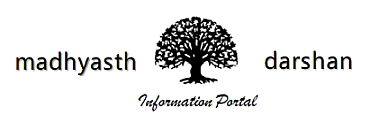The curiosity now is to know Brahman. The meaning of the word ‘Brahman’ needs to be made clear.
This curiosity to know Brahman is for becoming illusionless or doubtless about “I” and “mine”.
“I” is the nucleus of conscious unit (configurationally perfect atom or jeevan), also called as ‘atma’.
Mun, vritti, chitta and buddhi are inseparable from “I” (atma). The sadhana (endeavours for consciousness development) is for instilling potential in these to be in accordance with atma. The inseparable set of these four is known as “mine” and their becoming in accordance with atma is known as “awakening”.
This (harmony in all parts of jeevan) itself is awakening of self (jeevan).
There is natural curiosity in human being for comprehension of self (to know who I am) and Realization in Brahman (The Absolute Reality). This curiosity is meaningfully resolved upon establishment of awakened education in human tradition.
Realization in Brahman is the Ideal of all human beings, because based on realization alone each human being evidences meaningfulness (resolution as clarity of why and how), realness (harmony in work and behaviour) and trueness (sustenance of awakening in human tradition) in their living.
“This” (Brahman) is immanent to all units at all places and always in the same way, while each unit is reachable for other units.
The realization of the immanent (Brahman), and experience and proximity of the reachable (units of matter) is well known.
Atma, despite being distinct from Brahman, is not subordinate, because the highest awakened or awakening part of nature is atma itself.
Illusion and awakening remain as possibility until the potential, capability and receptivity is attained (by human being) for realization in Brahman.
The intent of atma is Realization in Brahman. Therefore atma remains unaffected from mun, vritti, chitta and buddhi, which are inseparable from it.
Atma is madhyasth activity (sustenance) and Brahman is madhyasth – the Absolute.
Atma remains unaffected from the constructive and destructive activities and forces.
– Excerpts from English Translation of Manav Anubhav Darshan
Name: Rakesh Gupta
Status: Student
Date: Jan 2015
Write up status; DRAFT
Document Type: English Translated Version of Original Hindi by A Nagraj
Book: Anubhav Darshan
Reference: Jeevan Vidya, Madhyasth Darshan, Coexistentialism
